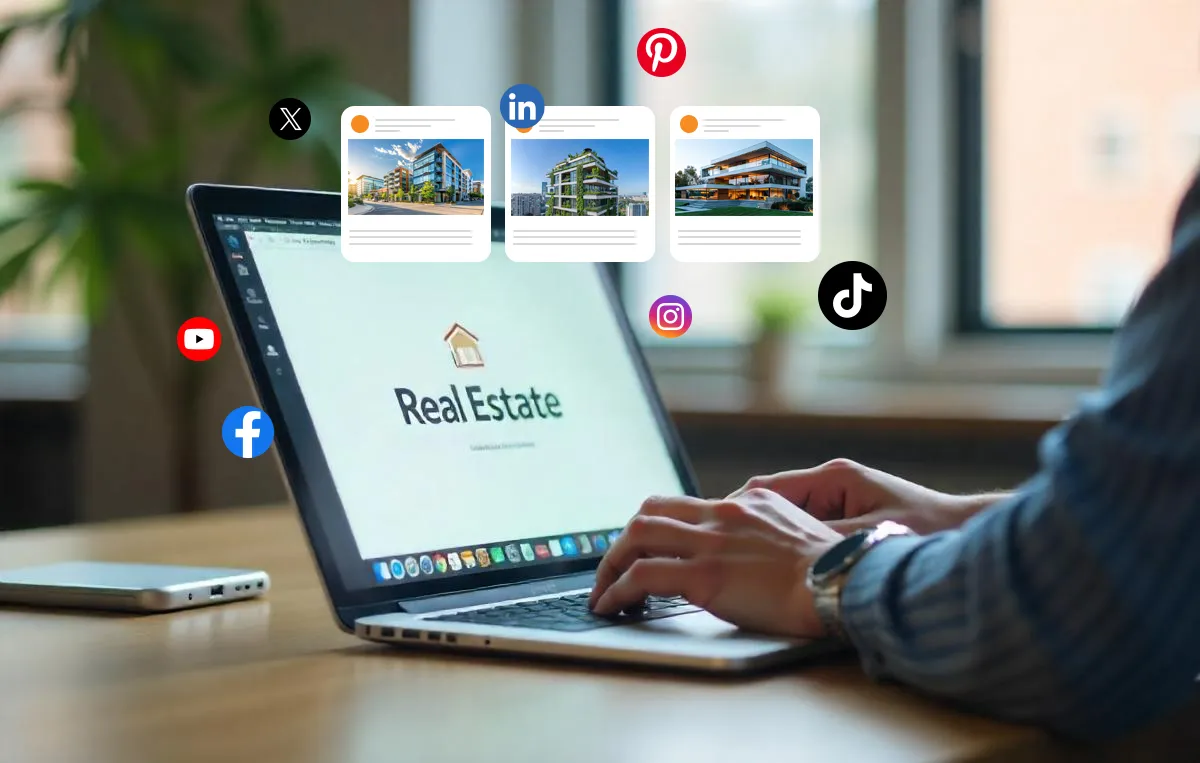Social media has changed how real estate professionals attract clients and close deals. Buyers now start searching online, scrolling through listings, and comparing agents before making contact. A strong social presence helps professionals stay visible, build credibility, and connect with the right audience.
A National Association of Realtors report found that 47% of real estate businesses generate their best leads through social media. However, success depends on choosing the right real estate social network platform.
Instagram and TikTok draw attention with short, engaging videos, while YouTube allows in-depth property tours. Facebook helps build relationships within local communities, and LinkedIn is useful for networking and referrals. Each platform serves a different purpose, and using them the right way can lead to more inquiries and sales.
This guide covers the best platform for real estate marketing and the pros and cons of social networks.
| Platform | Main Use Case | Popular Content Types | User Base & Reach | Key Benefits | Drawbacks |
| Visual property showcases & engagement | Property photos, short videos, virtual tours, Stories | 62% of Realtors use it; broad homebuyer audience | Highly visual, great for engagement & DMs | Needs frequent posts; competitive | |
| Community building & detailed listings | Listings, Live virtual tours, community groups, and Marketplace | 87% of Realtors use it; strong local community focus | Targeted local audiences, strong interaction | Algorithm changes can reduce reach | |
| YouTube | In-depth video tours & market advice | Full property walkthroughs, neighborhood guides, tips | 25% of Realtors use it; long-term content visibility | Video content stays searchable, a detailed showcase | Time-consuming video production |
| Professional networking & referrals | Market reports, investment deals, industry discussions | 48% of Realtors use it; great for commercial/luxury | Connects with investors & high-value clients | Less focus on direct property sales | |
| Twitter (X) | Quick updates & networking | Listings, market news, polls, event announcements | 10% of Realtors use it; fast-moving, broad reach | Easy to post quick updates; trending hashtags | Requires consistent activity |
We’ve highlighted the best social media platforms for real estate agents used by professionals and their potential for real estate marketing.
1. Instagram
Scrolling through Instagram is part of daily life for millions of people. Homebuyers are no exception. They scroll through social media, looking for inspiration, neighborhood insights, and homes that catch their eye.
Instagram allows agents to show properties through engaging content instead of plain listings. The right mix of videos, photos, and interactive posts can turn casual viewers into serious buyers.
In fact, a report found that 62% of Realtors use Instagram for marketing. But numbers alone do not make a platform useful. Instagram stands out because of how people interact with content. Buyers can watch short home tours, see before-and-after renovation projects, and ask questions directly in the comments or through private messages.
Types of Content You Can Create on Instagram
- Property Showcases: High-resolution photos, detailed captions, and virtual tours make listings more appealing.
- Behind the Scenes: Staging a home, setting up a photo shoot, or preparing for an open house gives followers insight into the process.
- Market Updates: Short videos or carousel posts explaining housing trends and mortgage rates keep potential buyers informed.
- Community Features: Local businesses, schools, parks, and attractions give buyers a sense of what it is like to live in the area.
- Client Stories: A testimonial from a happy buyer adds credibility and helps build trust with future clients.
Luxury agent Aaron Kirman (@aaronkirman) uses the platform to market high-end properties through cinematic home tours and behind-the-scenes industry insights. Aaron’s posts draw thousands of views and connect with serious luxury buyers.
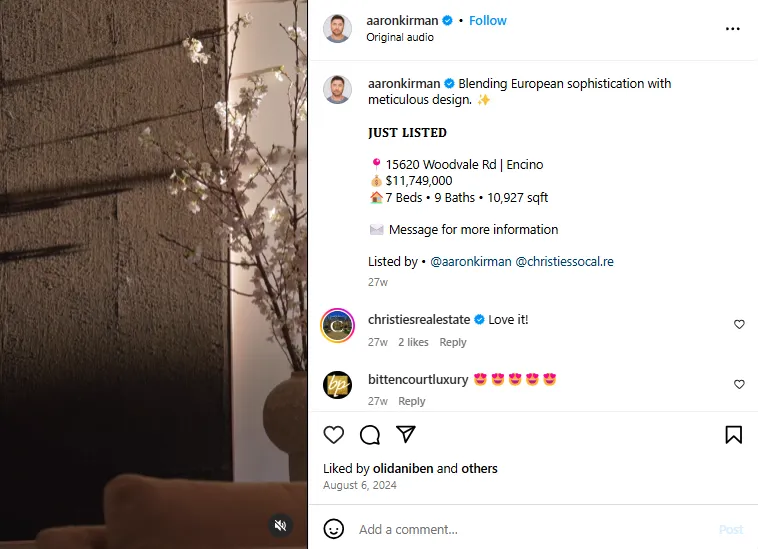
2. Facebook Pages
Facebook is one of the best platforms for real estate marketing. It has long been a go-to platform for real estate professionals, and its influence has not faded. With over 87% of realtors using Facebook in their real estate business, it remains one of the most widely used social networks.
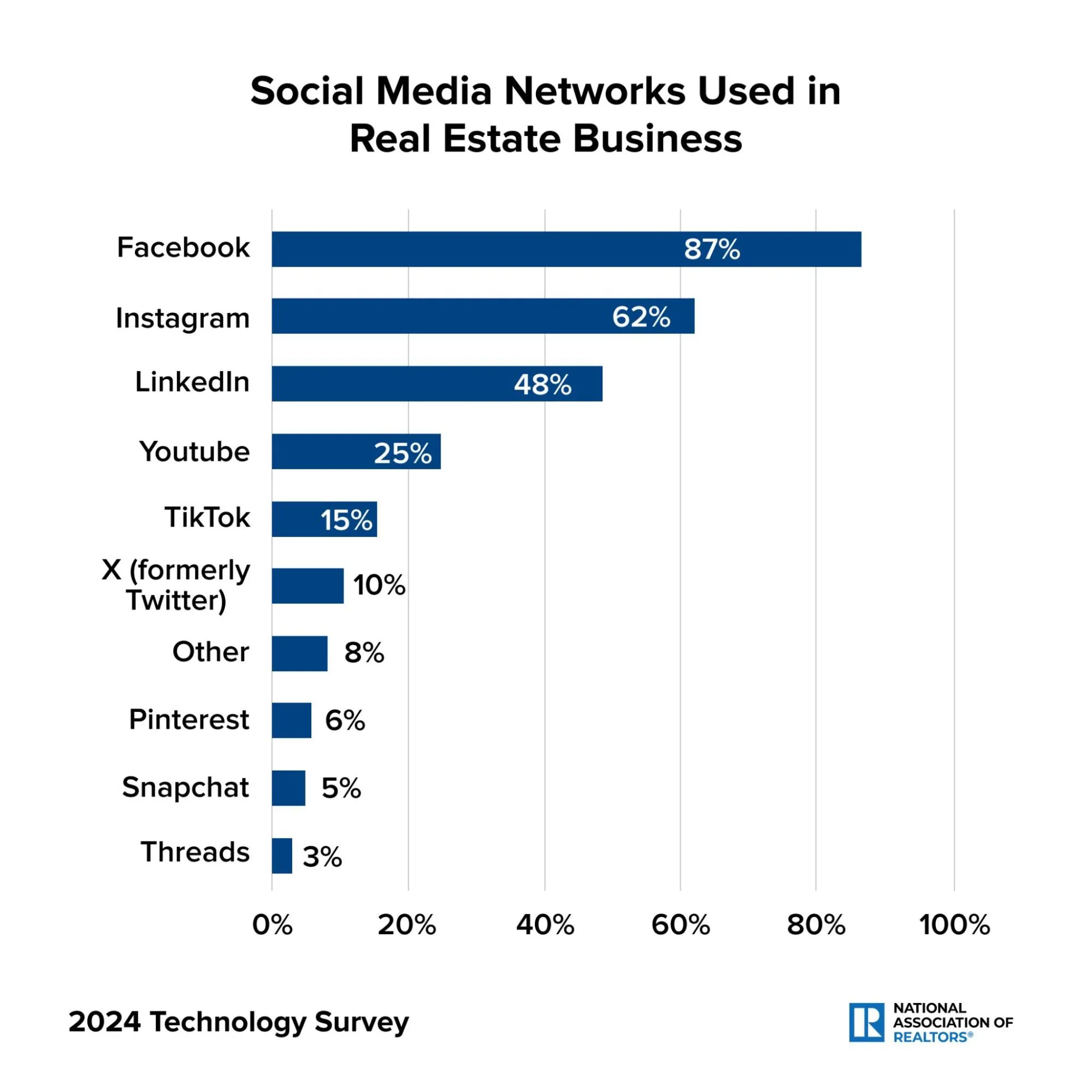
While Instagram is great for eye-catching visuals, Facebook offers a more structured way to present listings, engage with buyers and sellers, and build long-term relationships.
One of Facebook’s biggest advantages is its ability to connect agents with highly targeted audiences. Homebuyers often turn to local community groups, real estate forums, and Facebook Marketplace when searching for properties. Agents who stay active in these spaces can answer questions, share listings, and build a reputation as a trusted local expert.
Another key feature is Facebook Live, which allows agents to host virtual open houses. Instead of requiring buyers to travel to a property, an agent can walk them through the home in real time, answering questions as they come in.
This is especially useful for out-of-town buyers or those who prefer an initial online tour before scheduling an in-person visit. According to Facebook, live videos receive six times more engagement than regular videos. This helps directly in increasing visibility.
Type of Content You Can Create on Facebook
- Detailed Property Listings: High-resolution photos, in-depth descriptions, and pricing details give buyers a complete picture of what is available.
- Live Virtual Tours: Hosting live video walkthroughs allows agents to showcase properties in real time and answer buyer questions instantly.
- Market Updates and Advice: Sharing insights on mortgage rates, home prices, and buying trends keeps followers informed and engaged.
- Client Testimonials and Success Stories: Featuring past clients who found their dream home adds credibility and encourages new buyers to reach out.
- Community Spotlights: Showcasing local businesses, parks, schools, and upcoming events helps potential buyers learn more about the area.
One good example of using Facebook pages at their best is Erin Martin. A real estate agent who grew her business using Facebook by focusing on her local community. She created a page called “Huntington Beach Homes & Happenings,” where she shared local events, business spotlights, and community updates.
Instead of just posting listings, she built trust by providing useful information. This helped her gain over 22,000 followers (at the time of writing this) and led to around $120,000. Her success shows how engaging local content can attract potential buyers and establish an agent as a trusted expert.
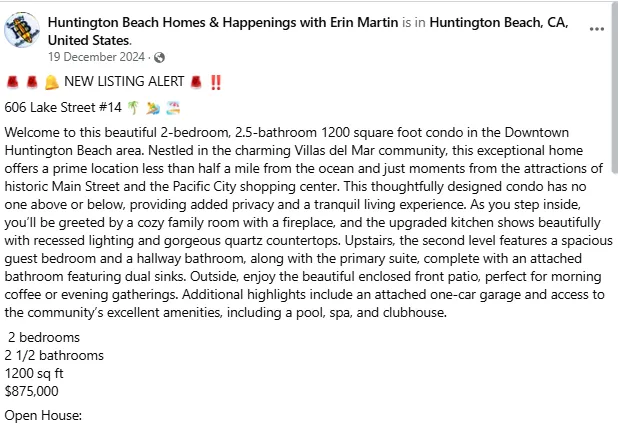
3. YouTube
YouTube is a powerful real estate social network that helps agents connect with buyers through detailed video content. Around 25% of realtors use YouTube for marketing, which shows its value in reaching potential clients.
YouTube videos stay available for years. It continues to attract viewers long after they are uploaded.
One of the biggest advantages of YouTube is the ability to create in-depth property tours. Instead of relying on photos, agents can film walkthroughs that show every detail of a home. Since YouTube videos often appear in Google search results, they can bring in buyers without the need for constant promotion.
Type of Content You Can Create on YouTube
- Property Video Tours: Walkthroughs that showcase homes in detail.
- Neighborhood Guides: Videos covering local schools, parks, restaurants, and amenities.
- Market Updates: Insights on home prices, mortgage rates, and buying trends.
- Home-Buying and Selling Tips: Advice to help buyers and sellers make informed decisions.
- Client Stories and Testimonials: Videos featuring past buyers and their experiences.
For example, Courtney Murphy is a Denver-based real estate agent who uses YouTube to showcase homes and help buyers explore different communities. Her Denver Real Estate Channel (Mile High Homes and Land) features property tours, builder home walkthroughs, and insights into the local market. With 6.73K subscribers, she has built an audience of homebuyers looking for detailed and honest reviews of properties.

4. LinkedIn
Next in our list of best social media platforms for real estate agents is LinkedIn. 48% of realtors use LinkedIn to grow their network, connect with high-value clients, and position themselves as market experts.
Posting market reports, investment opportunities, and industry updates helps agents position themselves as experts. Buyers and investors use LinkedIn to research agents before reaching out.
A well-optimized profile with a professional photo, client recommendations, and a strong summary can also increase credibility and increase inbound inquiries. Engaging with real estate groups, commenting on trending topics, and sharing in-depth posts can help agents stay visible to potential clients.
Commercial and luxury real estate agents benefit the most from LinkedIn. Business owners searching for office spaces, retail properties, or investment deals often use the platform to find professionals.
Type of Content You Can Create on LinkedIn
- Market Reports & Housing Trends: Sharing data and insights to attract buyers and investors.
- Investment Opportunities: Showcasing high-potential real estate deals.
- Relocation Services: Connecting with professionals moving for work.
- Commercial Property Insights: Helping businesses find office or retail spaces.
- Industry Discussions & Educational Content: Posting about mortgage changes, real estate policies, and negotiation strategies. Agents who stay active and provide valuable insights can turn LinkedIn into a consistent source of leads and professional connections.
Take, for example, Nicki & Karen Southern California Luxury Real Estate. They use LinkedIn to connect with buyers and investors by sharing valuable content.
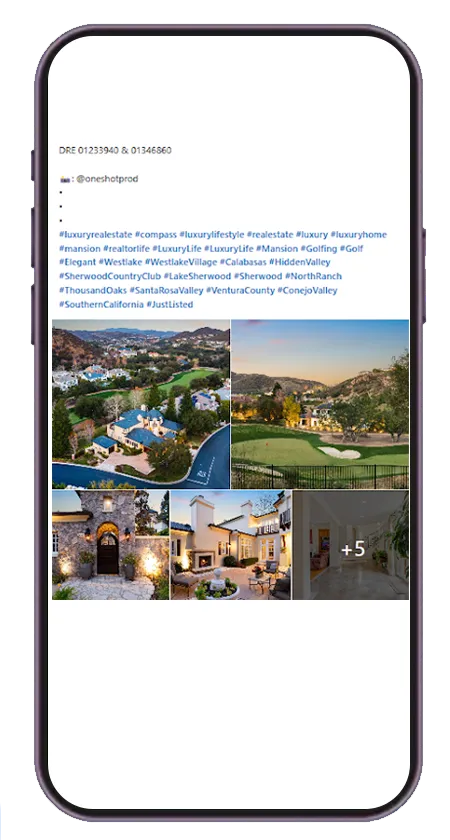
5. X (formely Twitter)
X is a fast-moving platform that helps real estate agents stay visible and connect with potential buyers, sellers, and industry professionals. 10% of realtors use Twitter. This makes it a valuable space for networking, sharing listings, and engaging in real-time conversations about the market.
Twitter’s short posts encourage quick interactions, which makes it easier to stay active without spending too much time on content creation.
One of Twitter’s biggest advantages is its reach. Agents can use trending real estate hashtags to make their posts discoverable beyond their immediate followers. Popular hashtags also help attract potential buyers and sellers searching for market updates.
Agents can grow their network and build credibility by replying to tweets, retweeting industry news, and engaging with local businesses.
Twitter is also useful for sharing time-sensitive updates. Whether announcing an open house, posting a market trend, or responding to buyer inquiries, agents can provide quick updates that engage their audience.
Type of Content You Can Create on Twitter
- New Listings: Share photos and key details with a link to the full property page. Use hashtags like #JustListed and #ForSale to increase visibility.
- Market Trends and Insights: Post quick updates on home prices, mortgage rates, or local real estate trends to inform followers.
- Client Testimonials: Share short success stories or quotes from happy buyers and sellers to build trust.
- Neighborhood Spotlights: Highlight local restaurants, schools, and businesses to showcase the community’s appeal.
- Live Q&A or Polls: Engage with your audience by answering common real estate questions or running polls about market preferences.
- Event Announcements: Promote open houses, webinars, or networking events to attract potential buyers and industry connections.
Take, for example, Kara Gabbert Keller, a Chicago-based real estate agent with Baird & Warner. She uses Twitter to promote her listings and attract buyers. In one of her tweets, she shared details about an open house, including the date, time, price, and a link for more information. This helps her reach more people who may be interested in the property.
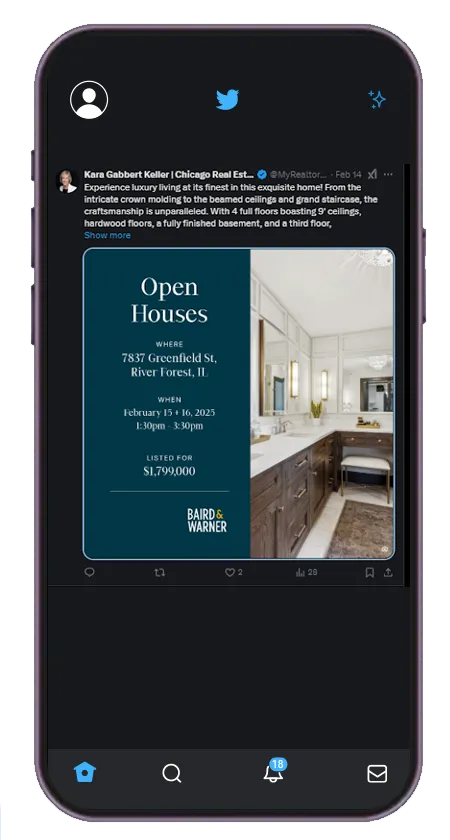
Managing multiple social media accounts for real estate can be tiresome, but SocialPilot makes it easier. Agents can schedule posts, track engagement, and manage multiple accounts from one place. This helps them actively promote their listing without spending too much time on social media.
SocialPilot also has tools to help realtors share property listings more easily. Agents can keep their posts consistent with features like bulk scheduling and content curation. It also works with Zillow, which allows agents to turn property details directly into social media posts in one click. This keeps listings updated and saves time.
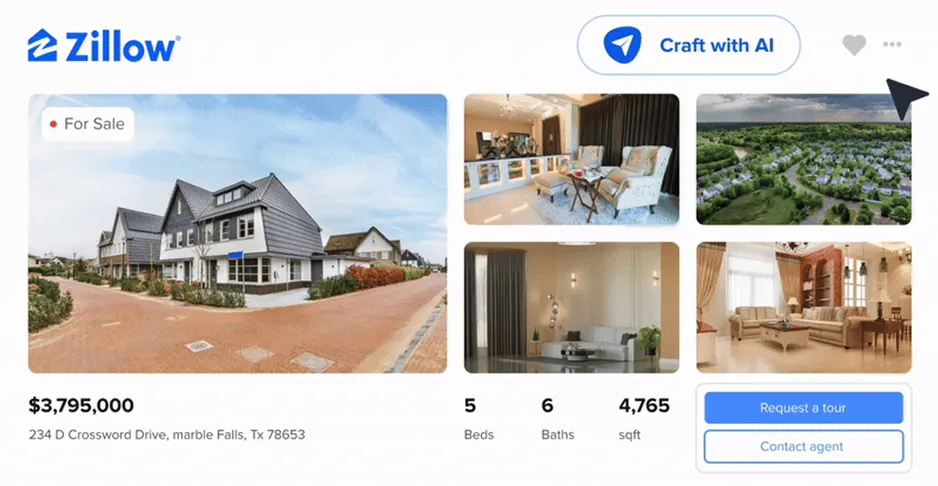
Not every social media platform for realtors works the same way. Some are better for showcasing properties, while others help with networking and building industry connections. Choosing the right one depends on how you plan to market your business and interact with clients.
1. Who uses the Platform?
Each social media platform for realtors attracts a different audience. Some are better for first-time homebuyers, while others work well for networking with investors or business professionals.
- Facebook has a broad user base, including buyers, sellers, and investors. Many homebuyers join local groups and browse Marketplace listings.
- LinkedIn attracts professionals and investors. Agents looking for commercial real estate opportunities or high-value clients benefit from this platform.
- Instagram and YouTube focus on visuals, which makes them ideal for agents highlighting properties with high-quality photos and videos.
- Twitter is useful for industry discussions, real estate news, and quick updates about market trends.
A strong platform choice aligns with the clients an agent wants to attract.
2. What Type of Content Works Best?
Some social media platforms for realtors focus on visuals, while others support long-form posts or quick updates. The best choice depends on the content an agent wants to create.
- Instagram and Facebook work well for listing photos, Reels, and property walkthroughs.
- YouTube is best for in-depth video tours and real estate advice.
- LinkedIn and Facebook allow detailed market insights, professional networking, and industry-related posts.
- Twitter is more suited for short updates, property alerts, and discussions.
3. How Easy Is It to Engage with Clients?
Social media should make it easier to connect with potential buyers and sellers. Some real estate social networks offer better interaction options than others.
- Facebook Groups and Marketplace let agents interact with buyers and sellers in local communities.
- LinkedIn Messaging and Comments help agents connect with professionals and referral sources.
- Instagram and Twitter Direct Messages allow quick responses to buyer inquiries.
- YouTube Comments create opportunities to engage with viewers interested in listings or real estate tips.
4. How Much Time Does It Require?
Some platforms need frequent updates, while others allow scheduled content. Time investment varies based on platform choice.
- YouTube takes more effort due to video production and editing.
- Instagram and Twitter need regular updates to stay visible.
- Facebook and LinkedIn allow scheduled posts while still supporting direct engagement.
Agents with limited time may prefer platforms that support scheduled content.
5. How Good Is It for Lead Generation?
A social network should help realtors generate leads by attracting serious buyers and sellers.
- Facebook Marketplace and Groups create direct selling opportunities.
- LinkedIn Connections helps with referrals from mortgage brokers, attorneys, and business professionals.
- Instagram and YouTube attract attention through engaging property content, which can lead to inquiries.
- Twitter works best for staying active in industry conversations and getting referrals.
6. Does It Support Local or Global Reach?
Some platforms are better for reaching local buyers, while others connect agents with international investors.
- Facebook and Instagram target local audiences through community groups and geo-targeted ads.
- LinkedIn and YouTube have a broader reach which makes them useful for agents working with out-of-town buyers.
- Twitter connects agents with local and global audiences through trending topics and hashtags.
Agents should choose a platform based on whether they want local homebuyers or a wider audience.
Let’s take a look at the advantages and drawbacks of using social networks for real estate.
1. More Visibility for Listings and Services
Social media allows real estate agents to showcase properties and services to a broad audience. Traditional marketing, such as newspaper ads and flyers, has limited reach, while platforms like Facebook, Instagram, and YouTube can display listings to thousands of potential buyers.
Agents who post high-quality images, videos, and virtual tours often attract more engagement. A well-optimized profile with regular updates ensures that potential clients remember the agent when they need real estate services.
2. Direct Communication with Buyers and Sellers
Social networks make it easy to communicate with potential clients. Buyers and sellers can send messages, ask questions, and get quick responses. Facebook Messenger, Instagram DMs, and LinkedIn messages allow for private conversations, while comments and discussions on posts help create public engagement.
This direct interaction builds trust and keeps agents connected with people who may be ready to buy or sell.
3. Lower Marketing Costs
Advertising on social media is often cheaper than traditional marketing. Running a Facebook ad or Instagram ad to promote a listing costs much less than a billboard or newspaper ad.
Even without paid ads, agents can reach potential buyers by posting consistently. A strong social media presence helps attract leads without requiring a large budget.
4. Better Engagement with Video Content
Real estate marketing works best when buyers can see the details of a property. YouTube videos, Instagram Reels, and Facebook Live tours allow agents to showcase homes and neighborhoods.
A video walkthrough can make a property feel more real than a photo slideshow. An engaging video highlighting a home’s best features can encourage buyers to take the next step.
5. Learning Market Trends and Buyer Preferences
Agents can learn much by observing what clients respond to on social media. Comments, likes, and shares give clues about buyer interests.
Following real estate groups and industry influencers helps agents stay updated on market trends. Understanding what buyers and sellers are looking for makes creating content that gets attention easier.
1. Requires Consistent Effort
Social media does not work well if it is used only occasionally. Agents need to post regularly, respond to messages, and engage with followers.
Without a plan, managing multiple platforms can be overwhelming. Tools like SocialPilot help by scheduling posts, tracking engagement, and automating content sharing. Agents can plan posts, stay active without daily effort, and get insights on what works best. This saves time and keeps social media profiles consistent while focusing on real estate deals.
2. High Competition
Many agents use social media, which makes it harder to stand out. Posting the same type of content as everyone else may not bring in new clients.
Agents who want better results need to post unique content. High-quality photos, well-written captions, and engaging videos help attract attention.
3. Changing Algorithms Can Reduce Reach
Social media platforms change how they display posts. Even if an agent has many followers, their content may not always appear in their audience’s feed.
Encouraging engagement through comments and shares helps keep posts visible. Trying different types of content, like videos and stories, also increases the chances of reaching more people.
4. Risk of Negative Comments
Since social media is public, agents may receive negative feedback. A past client, a competitor, or a random user could leave a nasty comment on a post.
Handling criticism professionally here becomes slightly important. Deleting comments or arguing with users can damage an agent’s reputation. Responding calmly and offering solutions helps maintain a good image.
5. Requires Marketing Knowledge
Agents unfamiliar with social media marketing for real estate may struggle to get results. Knowing how to use SEO, hashtags, and paid ads makes a big difference.
Those unsure about digital marketing can take online courses or hire a professional to assist with content creation and advertising.
6. Privacy and Security Concerns
Posting too much information about a property can attract scammers. Fake buyers, phishing scams, and identity theft are risks of using social media.
Agents should be careful about sharing complete addresses or personal details in public posts. Verifying potential buyers before scheduling meetings adds another layer of security.
Grow Your Real Estate Brand with the Right Platforms
Building a strong presence on a real estate social network takes consistency and the right strategy. Instead of trying to be everywhere at once, focus on the platforms where your target audience is most active. Create content that adds value, whether it’s market updates, virtual tours, or success stories. Then, engage with your followers regularly.
Track what works and adjust your strategy based on engagement and results. If certain posts get more responses, create more of that type of content. If a platform isn’t bringing leads, shift your efforts elsewhere.
To stay organized and save time, you can use SocialPilot to schedule posts, track performance, and manage all your accounts in one place. With a clear plan and the right tools, you can build a strong online presence and turn social media into a reliable source of leads for your real estate business.

